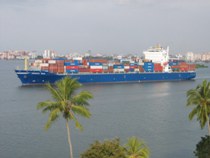While the stock markets across the world have fallen on the back of the credit crisis in Greece and its contagion effect, shipping rates for dry bulk carriers have firmed up since the development. The Baltic Dry Index, the benchmark for the freight rate of dry bulk carriers, has risen 30 per cent in the last three weeks to 3,929, which is also a six-month high for the global index.
 However, the rise has bypassed the Indian shipping industry whose stocks have largely fallen in that period.
However, the rise has bypassed the Indian shipping industry whose stocks have largely fallen in that period.
"China has increased its import of iron ore from long distance sources such as Brazil and Australia, pushing the demand for Capesize vessels," said Amit Agarwal, an analyst with SBI Capital Markets.
Capesize vessels are large ships with a capacity of more than 1,50,000 dead weight tonne, and are largely deployed on the long-distance route for the economies of scale. Currently, Capesize vessels have a freight rate of $45,000 per day for delivery across the Atlantic region. The break-even for such ships is about $30,000 per day, including their interest cost and depreciation.
"The contribution of Capesize vessels to the Indian fleet is negligible. Therefore, the domestic shipping companies have not gained," said Agarwal.
The stock of GE Shipping has fallen 9 per cent to Rs 301 a share during the last three weeks, while those of Mercator Lines and Essar Shipping have dropped 13 per cent and 8 per cent to Rs 53 and Rs 85 a share, respectively. The state-owned Shipping Corporation of India has, however, gained in this period by 3 per cent to Rs 166 a share.
The Sensex, the benchmark index of the Bombay Stock Exchange, has lost 5 per cent to 16,835 in the same period.
"There has also been an uptake in the movement of food grain from the US and sugar from Brazil, but largely the rise in Baltic is on the back of an inventory building of iron ore and other metals by China," said K S Nair, director (bulk carrier and tanker segment), SCI.
The state-run company has 19 dry bulk carriers, the highest in the country.
The Baltic Dry Index reached a 22-year-low of 663 in December 2008, sliding nearly 95 per cent in just about seven months from an all-time high of 11,793 in May 2008. The rates had collapsed as steel producers cut output as recession hit the global consumption.
Since then, the index has been quite volatile. It first recovered to 4,291 in June 2009, as China started building inventory for iron ore, but again fell to 2,163 two months later as China stopped building inventory.
It reached 4,661 in November 2009 and then dropped to 2,566 in February this year. "There is overall improvement in economy and Baltic looks quite sustainable at this stage," said Nair.






